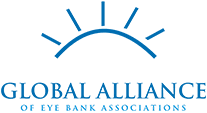A new global data project on human tissue use in corneal transplantation
The Global Alliance of Eye Bank Associations (GAEBA) announces a long-term project to capture annual data on corneal transplants, corneal donations and tissue movement across countries – with other data sets potentially to follow.
“Right now, we do not have access to global rates regarding corneal transplantation, donation or utility” says GAEBA Representative, Dr. Graeme Pollock.
“This means the sector, its members, end-users (surgeons and researchers) and the wider eye care community, is unable to develop effective strategies to plan for the long-term need of human tissues for transplant, training and research, nor do they have adequate data to commence conversations with legislative and governing bodies or build new partnerships with those outside of the sector.”
“We would like to change that, to ensure all members of the sector and community have access to adequate data. We want them to be able to plan effectively and ensure resources are utilised appropriately. To do that the sector requires an annual account of human tissue donation and use.”
“The new project is designed to provide annual de-identified data at a national level. We will not be identifying the eye banks, surgeons or hospitals, and nor will we be analysing the outcomes, we will simply present the raw de-identified data for those seeking such information.”
“Our challenge will be collecting the data and encouraging those who are not routinely collecting data to get involved.”
“Our approach has been inspired by the WHO Guiding Principles on Human Cell, Tissue and Organ Transplantation, the IAPB Vision Atlas, and the work of Gain et al (2015). We hope to complement those activities long term,” says Pollock.
About the Project
- Annual calendar year data will be collected and made publicly available.
- The data will be published at the country-level only. All provider details will be withheld to not identify the company/organisation, eye banker, surgeon or hospital-transplant facilities, or partners.
- The system will commence with collecting 2019 data. This will be collected in the first half of the following year.
- Surgeons and hospital-transplant facilities that import tissue because they do not have an eye bank serving them from within their country, will be connected individually and encouraged to develop a national tally system for submission. GAEBA will be available to assist development of national tally systems.
There will be two collection methods.
- Eye banks that are members of a formal eye bank association shall continue to submit their data to their own eye bank association. The associations will de-identify and submit data to GAEBA annually on their behalf.
- Non-eye bank members or those located in countries/regions without an association or eye bank, (meaning they only import), are invited to contact our GAEBA Project Lead, who will collate and submit data on their behalf until that nation establishes a formal contact point or association.
GAEBA will commence with capturing 2019 data. We will promote the importance of data capturing across the sector and to a wide range of individuals and groups. We invite interested sector and community groups to get involved as Data Champions and help promote the necessity for routine annual data in this area of service. By encouraging eye banks, surgeons or hospital transplant facilities and partners to submit data, Data Champions will be helping to improve public health in their area.
We recognise and thank our Data and Mapping Project Lead, Brian Philippy (EBAA/Lions) and Team Members, Amber Benbow (EBAA/Lions), Heather Machin (EBAANZ/Lions), and Luke Weinel (EBAANZ) for their support.
To find out more – or help support the project as a Data Champion, please contact the Collection Team via: heather.machin@unimelb.edu.au
- Gain P, Jullienne R, He Z, Aldossary, M, Acquart S, Cognasse F., & Thuret G. Global Survey of Corneal Transplantation and Eye Banking. JAMA Ophthalmol. 2015. December 3. E1-E8.
- International Agency for the Prevention of Blindness. Vision Atlas. http://atlas.iapb.org/.
- World Health Organization. Guiding Principles on Human Cell, Tissue and Organ Transplantation.
Data Champions
We would like to thank and acknowledge the below eye bank individuals and organizations who are supporting the global community to develop the global data collection system. They will be promoting forward the importance and value of data collection within their domestic and international networks, via various education and promotional mediums and platforms.
We would like to thank and acknowledge our data project leads, Brian Philippy and Amber Benbow (Lions Clubs International – Eye Bank Working Group) and Luke Weinel (EBAANZ, AU).
